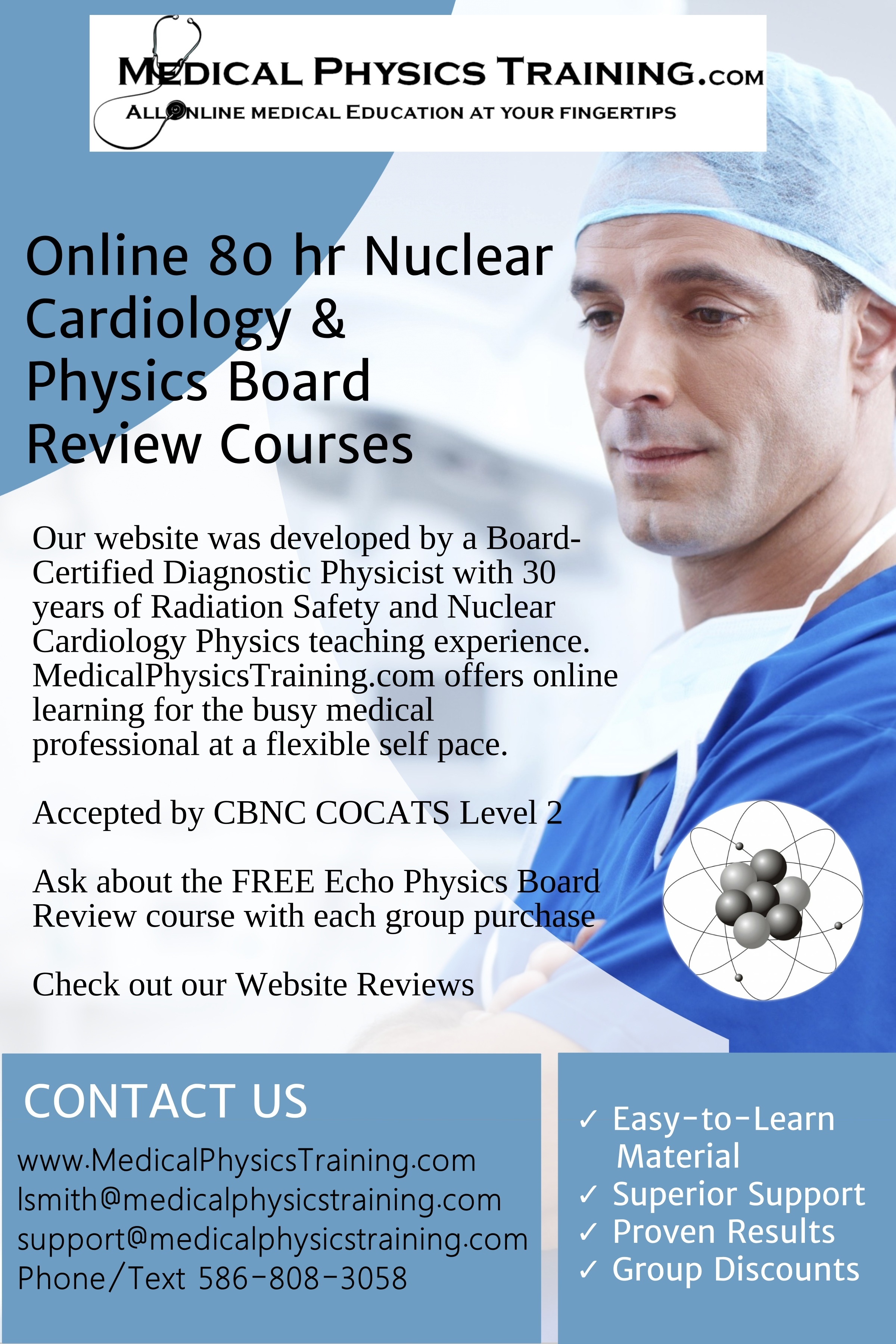
CBNC/APCA Nuclear Cardiology Physics 80-Hour Online Course
Already signed up; link to Course: Course: 80hr Nuclear Cardiology Physics Online Course (medicalphysicstraining.com)
Email lsmith@medicalphysicstraining.com for discounts and the lowest prices on our course access or purchase directly through the site's PayPal link.
Courses start at $370 (group discounts available as low as $330 for 6 or more, and very lowest is $300 for 10 plus students in a group). No memberships are required. In addition, you get a Free Echocardiography/PVI/US Physics board review course with every purchase. You also have unlimited access to the course until you pass your boards. Our program keeps your progress; it is not necessary to restart if you take any time off from your studies, your progress is tracked and maintained. This video will give you a quick idea of what to expect from our course. Course updated 2025.
Course Registration
Course Applications
- CBNC/ APCA Board application requirements. Complete our 80-hr course to sit for the CBNC/APCA boards. Our Cardiology Physics course includes the requirements for your classroom training, including Radiation Safety, an extensive review of radiation physics and instrumentation, radiation protection, mathematics about the use and measurement of radioactivity, the chemistry of byproduct material for medical use, radiation biology, the effects of ionizing radiation, and radiopharmaceuticals. There should be a thorough review of regulations dealing with radiation safety for the use of radiopharmaceuticals and ionizing radiation. This experience should total a minimum of 80 hours and be documented.
- ACGME Online Nuclear and Radiology courses are available - ask lsmith@medicalphysicstraining.com for details.
USNRC and most agreement states require an Authorized User to have at least 80 hours of classroom and laboratory physics training.
Our students also have continued online access to use the course as a Nuclear Cardiology Physics study review for their CBNC board exam.
All course material was recently updated.
- Course Material - No webcams required.
Course Outline
Section 1: Radiation Protection and Safe Radioisotope Handling (20 hours)
- Regulatory Requirements
- Forms of Radiation
- Radiation Units
- Radiation Protection
Section 2: Radiation Physics and Instrumentation (25 hours)
- SPECT and Planar Nuclear Imaging – Gamma Cameras
- SPECT and Planar Nuclear Imaging – Data Corrections
- SPECT and Planar Nuclear Imaging – Tomographic Imaging
- SPECT and Planar Nuclear Imaging – Quality Control
- PET Imaging – PET Cameras
- Dedicated PET and PET/CT Imaging – Tomographic Imaging
- PET Imaging – Quality Control
- Image Post Processing
- Tracer Kinetics
- Clinical Optimization of Radiopharmaceutical Dosing
- Application of Technology for Radiation Reduction
- Other Clinical Applications of Planar, SPECT, and PET Imaging: Image Acquisition and Processing
Section 3: Radiochemistry and Radiopharmaceuticals (10 Hours)
- Managing a Hot Lab
- Radionuclide Production and Radiopharmaceuticals
- Quality Control of Radiopharmaceutical Production Kits
Section 4: Radiation Biology (10 Hours)
- Radiation Biology Overview
- Radiation Injury, Cell and Organ Responses
- Risk Models, Exposure Limits, Deterministic and Stochastic Effects
Section 5: Nuclear Medicine Mathematics and Statistics (15 hours)
- Measuring Radioactive Decay
- Shielding Calculations
- Mathematics of Imaging
- Mathematics of Radioactivity
- Radiation Physics and Instrumentation (25 hours)
- Radiation Safety and Protection (20 hours)
- Mathematics about the use and measurement of radioactivity (15 hours)
- Chemistry of byproduct material for medical use (10 hours)
- Radiation Biology (10 hours)
Detailed Laboratory Procedures Provided—All required laboratory material is provided for you to work with the Authorized User at your facility. We will work with you and the Authorized User to ensure you know exactly what is required to complete your laboratory training. Your Authorized User will sign off on the laboratory portion of your training, typically as part of your preceptor attestation letter.
Course Completion Certificates require:
- All course material was thoroughly reviewed.
- Seven case studies are completed with a score of 80% or higher.
- Complete each lecture quiz with a score of 85% or higher. You may take each quiz as many times as necessary to achieve a passing score.
- Complete the course review quiz with a score of 82% or higher. You may take the quiz as many times as necessary to achieve a passing score.
Course Tuition
Courses start at $380 for a single user and are as low as $330 for large groups. No memberships are required. In addition, you get a Free Echocardiography/PVI/US Physics board review course with every purchase. Course Registration

Course Disclaimer: We here at Medical Physics Training make every effort to produce excellence in your regulatory education. When new guidelines or rules and regulations are updated, we will make every effort to update our courses as necessary in a timely manner. Responsibility for regulatory compliances remains with the facility; therefore, we encourage you to routinely check all relevant regulatory agencies directly and regularly to ensure the latest updates for clinical and administrative guidelines that apply to your staff.
Please report any concerns about patient safety or quality of care at your location to your accrediting organization.
The course developers and operators of this site assume no liability or responsibility for any injuries, illnesses, death, damages (either consequential, special, or incidental), or losses that arise from or are in connection with the use of these materials and information.
Additionally, the developers and site operators do not represent these materials' timeliness, thoroughness, or accuracy. By continuing with this course, you agree to indemnify the course developers and site operators against all claims and actions arising from using this material and the information provided on this site.